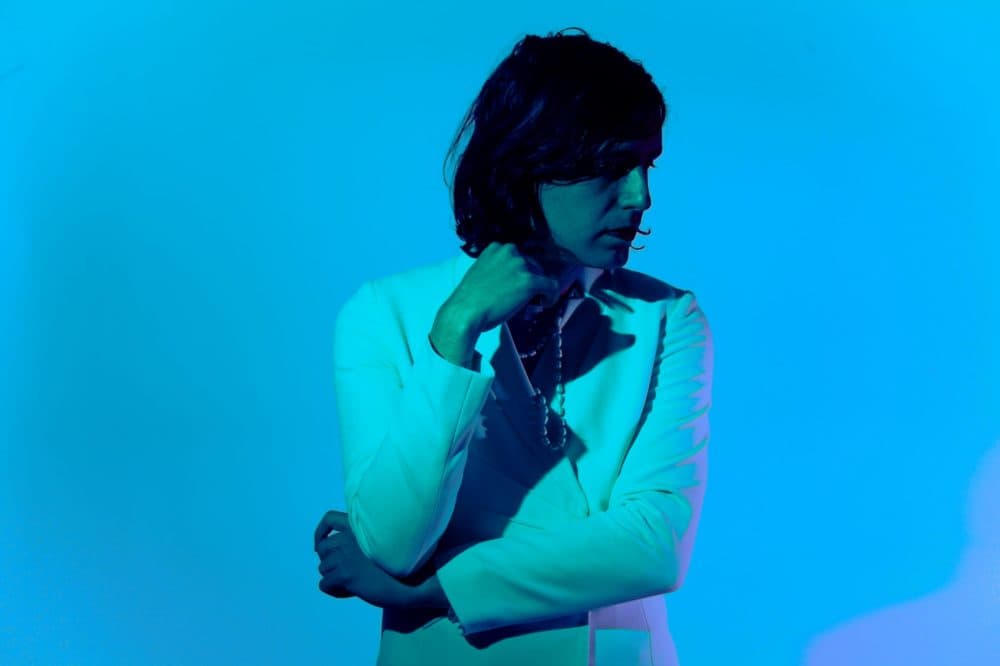Advertisement
Sound On
Ezra Furman Is Finally Making The Punk Music Of Her Teenage Dreams
Resume
This story is part of The ARTery’s ongoing Sound On series, highlighting rising local musicians.
Ezra Furman is just about settled into her new apartment. It’s January, five months since the singer-songwriter moved from Oakland to Somerville. Her living room bookshelves are crammed with novels and records, art prints dot the walls and everything seems to be in its place — except for one last empty cardboard box, which she’s currently using as an end table.

Getting unpacked has been no small feat for Furman, who’s already gone on tour twice since moving in: a September jaunt down the East Coast, followed by a string of November dates across Europe. But curled up on the sofa on this bright winter day, she’s starting to feel at home.
It helps that she has returned to a familiar neighborhood. Furman lived in Somerville a decade ago as a Tufts student, though plenty has changed since then. “My life is a very different machine to operate now than it was when I left at age 22,” she says.
Back then, she felt like she was flailing as a Tufts undergrad. Music was the thing that made sense to her. She’d spent years as an open mic night regular, and while she felt she was a solo artist by nature, her friends eventually talked her into starting a band. So, she became the frontperson of Ezra Furman and the Harpoons. Before long, they’d signed with indie label Minty Fresh, and in 2008 their single “Take Off Your Sunglasses” suddenly hit number one in Austria.
It was a fleeting success. Operating as a band got tougher, so Furman started to work on her own, moving between New York, Chicago and Oakland, and touring constantly.
Over the past decade, she released six more albums and a few EPs, published a book on Lou Reed’s “Transformer” and gradually used her work to open up about her identity as a queer, gender-nonconforming person. (Furman uses both "she" and "he" as personal pronouns.) She hit her musical stride, too: a combination of retro rock ‘n roll and punk energy, driven by thoughtful storytelling. A few albums in, glowing reviews in the British press increased her fan base around Europe, and lately, with her music heavily featured in the Netflix series “Sex Education,” her American following is starting to catch up.

Now 33, she’s at an unusual crossroads for an indie musician of her status. When Boston artists break out, they tend to break out for good, often leaving for big music-industry cities like New York City or Los Angeles. Few return to Boston while still on the upswing. But Furman thrives in a constant state of creative evolution, and now that she’s here, she’s making a focused effort to become a part of the local music community.
On this day she steers the conversation away from her personal life, though she admits it’s the reason she moved to the area. But Boston suits her as a musician, too. “I like being off to the side from the center of the world,” she says. “Boston is just a place where you work hard and you earn the respect of your community… I like that model of ‘build it yourself, while no one’s paying attention, and then the people who recognize good things will see that it’s good.' ”
These days, she’s finally getting that recognition. That’s at least partially due to her extensive contributions to the soundtrack of the dramedy series “Sex Education,” which debuted in early 2019. In its first two seasons, the show featured nineteen of Furman's songs, a combination of old and new. Last month, she released them all on “The Sex Education Original Soundtrack,” via Bella Union.
Her lyrical style is inherently vulnerable, which makes it a natural fit for a show about high-school characters running a secret business dispensing sex advice to their peers. “They’re all wondering if they’re normal or if it’s okay to be feeling what they’re feeling. And I think a lot of people notice in our music, a sort of ‘accept yourself’ overarching message. Like, ‘Yes, I feel it too. It’s okay to feel what you’re feeling,’” Furman says.
Her sound is also a match for the show’s retro aesthetic, which takes visual cues from the ‘80s and ‘90s, and additional music from the decades before. Furman explains that her own use of throwback elements — swing beats, wailing saxophones, doo-wop choruses — is partially the product of all the “musical debris” floating around in her head, but it’s also a useful way to set up bigger thematic ideas. That’s especially where the ‘50s and ‘60s influences come in. “I go to that music because I feel a sort of similar level of repression in my life, where I know that transphobia and heteronormativity are not going to destroy me, but I can feel it holding me back and I can feel myself pushing against it,” she says.
A similar tension lives in many of her songs, and it also hovers in the way she speaks. Too many conflicting ideas are hitting a sort of rush-hour bottleneck somewhere between her brain and her mouth. Language itself feels limiting at times, she explains.
“Making music, for me, is an effort to say things that can’t be said in social life, and can’t be said with just words, but need rhythm, melody, and harmony to be brought to the fullest expression and the infinite,” Furman says. “Sometimes, it’s as hard to talk about God as it is to talk about love. And there might not be that much difference between them.”
Talking about God has been on her mind these days. Furman is Jewish, and while her faith is prominent in her music, she admits that she gets tongue-tied when discussing spirituality with a secular audience. So she’s been trying to change that. She tries to pray daily, and has figured out how to formally observe the Sabbath on the road. It’s no simple task for a touring musician. For 25 hours each week, starting just before sundown on Friday, she doesn’t work, spend money, write or use electricity. That means no Friday night shows and no Saturday travel. “It’s the best part of my week, every week,” she says.
Life on the road can be isolating by nature, and she hasn’t met too many touring rock artists who are very religious. And despite the importance of spirituality in her life, she says traditional religious institutions haven’t always been very welcoming. “It has been a thing in my life as large as being queer, in terms of how alone I sometimes feel in it, and how difficult it is to talk about, and how much I need to learn to talk about it. Sometimes I feel like I’m a little behind on that, these dual coming-outs.”

For most of Furman's musical career, her songs have untangled her own thoughts and wrestled with an internal sense of contradiction. But more recently, her writing has taken a more instinctive approach to responding to the world. On last year’s “Twelve Nudes,” pure emotion finally overthrows Furman's internal editor, resulting in a brasher album that mostly scraps the retro sounds in favor of ragged vocals and distorted guitars. The lyricism is blunter, too. It’s the first time she’s let herself write in broader strokes, and it suits an album focused on purging panic and despair. She describes it as the punk record she’s wanted to make since she was a teenager. After spending so much time constructing careful arguments, it’s satisfying to finally let out an angry howl.
“It feels like a corrective to my own hopeful instincts as a writer, where I want to tell everyone everything is gonna be OK. Sometimes it is better to push in a different direction and to admit how bad something feels,” Furman says.
She’s exploring more of a raw approach to songcraft in other ways, too. Just a few weeks after the release of her “Sex Education” soundtrack, she’s already working on new material, which has been helped by her January “Intimacy” residency at ONCE Somerville. She’s been going back to basics, performing solo with an acoustic guitar. She thinks of it as a muscle that she needs to keep in shape, a way to make sure that songs hold their character without band mates or production. But it’s also been helpful for exploring where she might push her sound next.
“There’s something that’s happening right now that I feel like I want to start from scratch. Not assume anything about what the next record I will do will be like, and just find out what’s there,” she says.
It’s the right time for a fresh start. After a decade in constant motion, Furman is nothing if not fast to adapt. Settling in doesn’t have to be complicated.
“People talk a lot about cities being better than other cities. If you’re getting paid and getting laid, if there’s love in your life, then you are gonna be OK,” she says. “ I just need love and care to survive, like all people. And I’ve got that in Boston.”
This article was originally published on February 14, 2020.
This segment aired on February 14, 2020.


